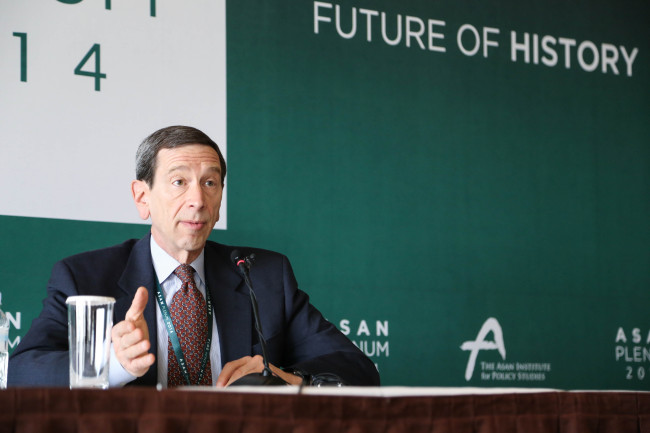Despite the increasingly powerful international sanctions against North Korea, China should play a greater role in boosting their effectiveness and curbing the Kim Jong-un regime’s nuclear ambitions, a former key U.S. administration official said Wednesday.
Robert Einhorn, who served as special advisor for nonproliferation and arms control to the U.S. Secretary of State and as a coordinator for Iran and North Korea sanctions until last year, also raised the need for strong punishment if the communist state presses ahead with a fourth nuclear test as threatened, which would be a “real mistake.”
“There is no question but if there is a fourth nuclear test, the U.S. will take additional actions, sanctions and steps that will increase the effectiveness of sanctions against North Korea,” Einhorn said at a news conference on the sidelines of the Asan Plenum hosted by the Asan Institute for Policy Studies in Seoul. He is currently a senior fellow at the Brookings Institution, a Washington-based think tank.
Robert Einhorn, who served as special advisor for nonproliferation and arms control to the U.S. Secretary of State and as a coordinator for Iran and North Korea sanctions until last year, also raised the need for strong punishment if the communist state presses ahead with a fourth nuclear test as threatened, which would be a “real mistake.”
“There is no question but if there is a fourth nuclear test, the U.S. will take additional actions, sanctions and steps that will increase the effectiveness of sanctions against North Korea,” Einhorn said at a news conference on the sidelines of the Asan Plenum hosted by the Asan Institute for Policy Studies in Seoul. He is currently a senior fellow at the Brookings Institution, a Washington-based think tank.

“But for that sanctions regime to be truly effective and even decisive in dealing with the North Korean challenge, it will be critical for China to play a much stronger role.”
Concerns have been rising since the North threatened a “new form of nuclear test” late last month in protest against the U.N. Security Council’s condemnation of its test-firing of ballistic missiles.
The past three rounds of Pyongyang’s atomic experiment have prompted Beijing to begin to “recalibrate and reassess” its ties with the unruly ally, Einhorn noted, such as sanctioning the Foreign Trade Bank, the North’s main foreign exchange institution, which is presumably involved in nuclear activities.
China plays a critical role in enforcing sanctions as North Korea’s top trade partner and economic patron.
Yet the recalibration has not gone far enough, he said, calling on Beijing to take stronger actions to denuclearize the peninsula rather than continue focusing on stability.
“Now (China) has to give high priority to denuclearization and because only through denuclearization can there be stability,” Einhorn said.
“It needs to recognize that North Korea now is a much greater liability to China than it is an asset for China.”
One way to contribute could be to tighten its grip on North Korean trade organizations, intermediaries and other entities operating in China. Many of them are engaged in illicit procurement for Pyongyang’s nuclear missile programs and the facilitation of its arms exports to countries around the world, Einhorn said.
“I think it’s important for China to look at this trade relationship and decide where it can cut back,” he added.
As for the ongoing nuclear talks with the so-called P5+1 countries and Iran, Einhorn downplayed their potential impact on South Korea-U.S. negotiations on revising their atomic energy pact, even if a comprehensive deal is reached to allow Tehran to have a limited enrichment capability.
Seoul and Washington have been working to amend the so-called 123 agreement since late 2010. It was signed in 1965 and last revised in 1974, and is due to expire next March.
But the negotiations have made little headway as Washington resists Seoul having its own capability to enrich uranium to low levels and reprocess spent fuel rods, at least for “the present time.”
“The United States has taken a view that the ROK (Republic of Korea) could continue to purchase enriched uranium fuel for its nuclear power reactors from abroad,” Einhorn said, calling it “the most efficient, cheapest way.”
“And also the ROK should recognize that the kind of limited enrichment capability that might be included in a P5+1 agreement with Iran would be not nearly sufficient to meet the enriched uranium needs for the growing ROK program.”
By Shin Hyon-hee (heeshin@heraldcorp.com)












![[Today’s K-pop] BTS pop-up event to come to Seoul](http://res.heraldm.com/phpwas/restmb_idxmake.php?idx=644&simg=/content/image/2024/04/17/20240417050734_0.jpg&u=)




![[KH Explains] Hyundai's full hybrid edge to pay off amid slow transition to pure EVs](http://res.heraldm.com/phpwas/restmb_idxmake.php?idx=652&simg=/content/image/2024/04/18/20240418050645_0.jpg&u=20240419100350)

